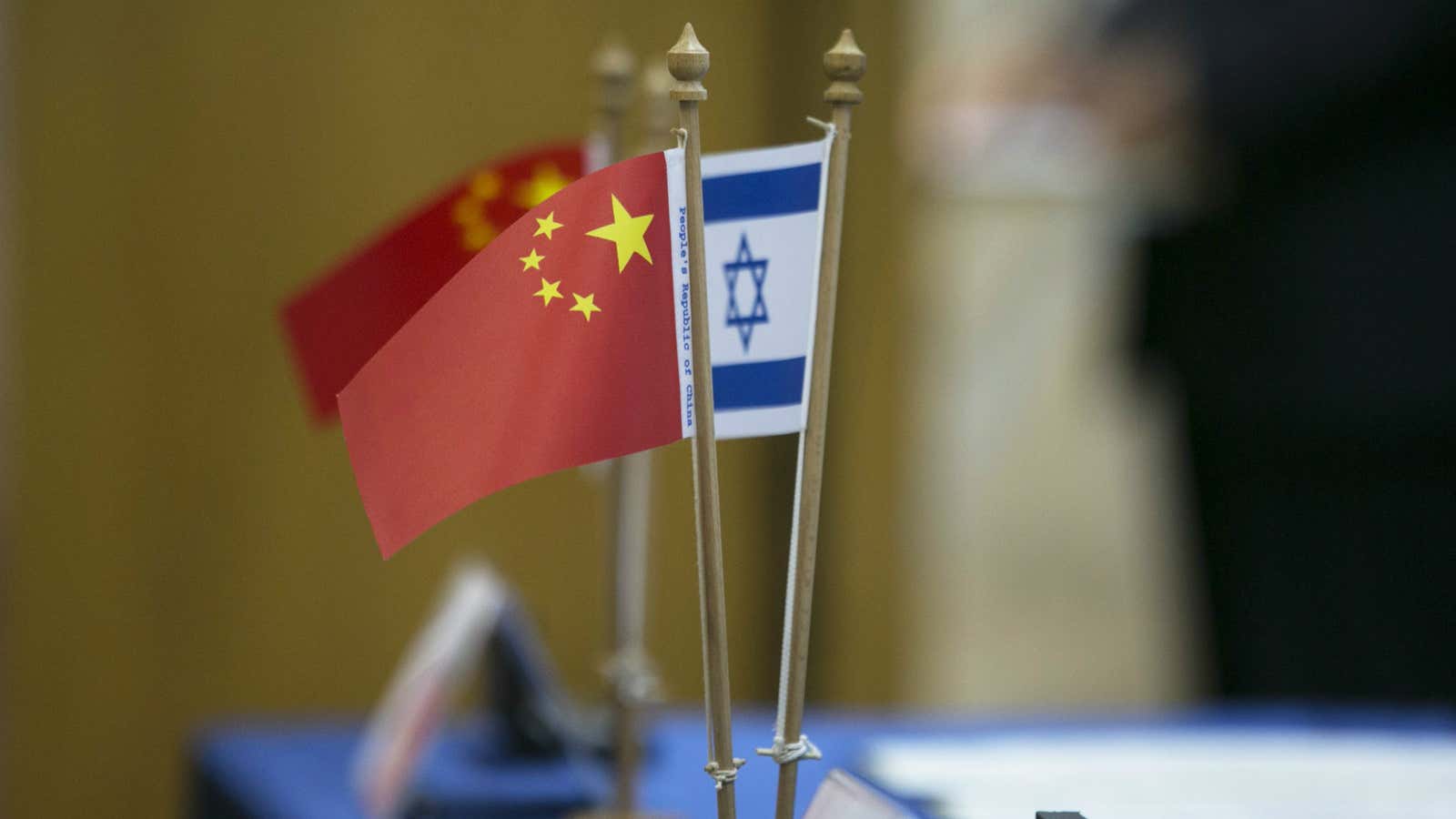With Facebook and Twitter blocked in China, foreign embassies looking to spread their message in China have to turn to WeChat and Weibo—two of the country’s biggest social media sites. While many of these missions struggle with engagement, and censorship by their host, one country is succeeding—for reasons that aren’t flattering to China.
Israel ranks as the foreign mission with the most followers on Weibo, China’s answer to Twitter, with over 1.9 million people subscribed to its page, according to research by the Australian Strategic Policy Institute (ASPI) on the activity of 10 foreign embassy accounts over the three months ended in January. The country’s embassy also had the fourth-highest number of likes per post, behind only the embassies for the US, UK, and Japan, countries with far greater cultural exports and economic ties to China, according to the study’s author, Fergus Ryan, an analyst focusing on cyber policy at the Canberra-based think tank.
What explains Israel’s appeal on Weibo? Shimi Azar, a former manager social media manager at the embassy, told the Chinese state media outlet Global Times that a well-publicized 2014 visit to China by former Israeli president Shimon Peres helped bring about a surge in followers. But an earlier study cited in Ryan’s report noted that it was not in the top 10 in 2015.
Another likely boost to the embassy’s popularity—its followers in China see its social media pages as an outlet for sharing Islamophobic comments, that at times become outright hate speech.
During the three-month study, the most-shared post from the Israeli embassy on Weibo was a nine-sentence message announcing Trump’s decision to recognize Jerusalem as the capital of Israel. The second most-liked comment on the post was “Put the boot into the cancer of humanity”—a likely reference to Muslims.
Similar comments can be found on other, more recent messages from the embassy. Beneath a post from May 19 (link in Chinese, registration required) showing photos of the Mahane Yehuda Market in Jerusalem, one user writes “Israel is a beacon of humanity, support Israel’s struggle against evil sects in the Middle East.” Another comment (link in Chinese, registration required), placed under a video commemorating International Women’s Day, reads “A clear difference between the surrounding Arabic countries, you’re the civilized ones.”
Anti-Islam sentiment has become widespread on the internet in China, which is home to about 23 million Muslims. Reports about violence in the Xinjiang region, home to China’s closely-surveilled Uighur population, often generate attention, while stories about services geared to Muslims—such as halal food deliveries—generate anger over “affirmative discrimination policies” toward Chinese Muslim minorities.
On the Israeli embassy’s Weibo account, many vitriolic comments remain have been left alone, even though China’s censors are known to quickly hide comments deemed too “sensitive” from the social media pages of foreign embassies.
For example, earlier this month comments on the US’s critique of China’s “Orwellian” political correctness—which the embassy posted in Chinese on May 7—were scrubbed, possibly because they expressed support of the stance. The statement came in response to a letter from China’s aviation authorities to airlines with instructions on how to list Taiwan, the self-governing island that Beijing says is part of “one China,” on their websites.
Ryan, for example, counted 28 instances of censorship affecting the US embassy’s Weibo page over the study’s period.
These posts largely touched on “sensitive” topics, like North Korea and China’s top leaders. The Israeli embassy’s account, meanwhile, was left relatively free of censorship, he said.
It’s possible, Ryan speculates, that either Weibo or the Israeli embassy’s account managers work behind the scenes to display comments that show blanket support for the country, while hiding anti-Israel comments. Some posts on the page themselves suggest that users suspect this too. Weibo and the embassy couldn’t immediately be reached for comment.
For example, beneath a post from May 14 (link in Chinese, registration required) marking the start of US recognition of Jerusalem as Israel’s capital, the top comments are all benign notes of congratulations, but further down one user wrote:
Did the Israeli Embassy’s Weibo account administrator just block my account? Is it afraid? The microblog I just issued was like this: “Israel is the world’s source of chaos. The Jews in the United States are madly retaliating against their country. By Israel’s logic, other people in the world can establish a nation in Africa because humans are from Africa.”
The account administrator responded stating the user’s account was not blocked, but “maybe it was the system filtering out your comment.”
